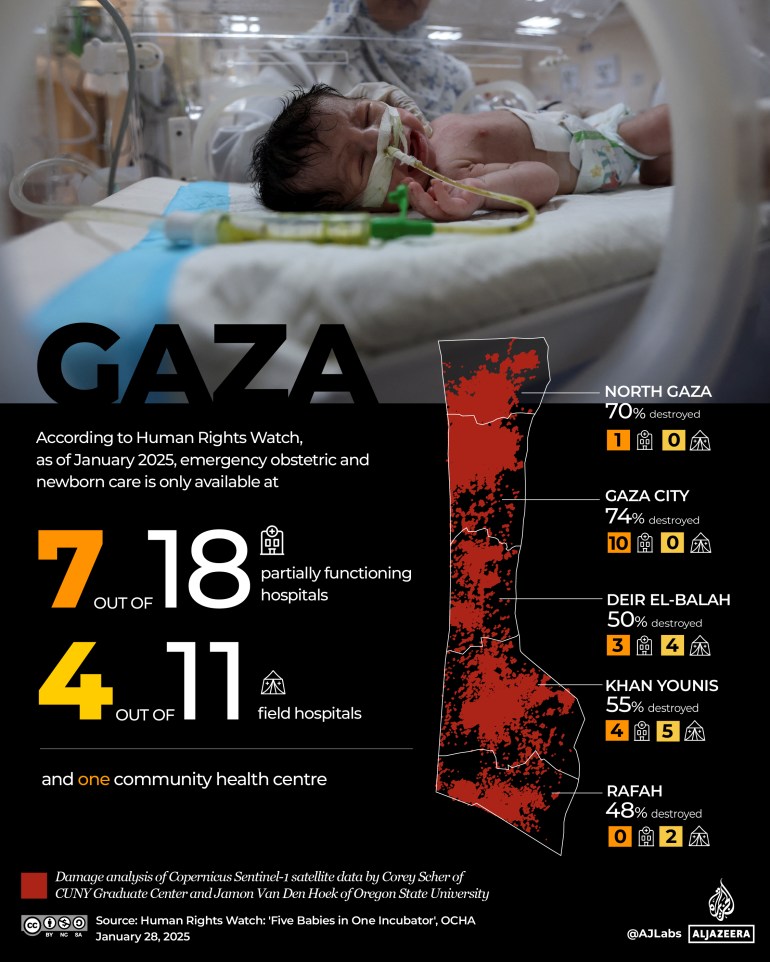According to Human Rights Watch (HRW), Israel’s 15-month war against Gaza, as well as the severe restrictions it placed on the flow of humanitarian aid, and Israeli forces’ attacks on health facilities and its targeting of healthcare workers, have created “life-threatening danger” for pregnant women and babies.
The group noted in the report released on Tuesday that despite the ongoing ceasefire, the precarious conditions in which Gaza’s women are giving birth are unlikely to improve because Israeli legislation that targets the UN Relief and Works Agency for Palestine Refugees (UNRWA) and effective this week is expected to severely restrict the flow of humanitarian aid to the devastated region.
Women in Gaza were sometimes rushed out of overcrowded hospitals within hours of giving birth to make room for war-torn patients. The al-Helal al-Emirati Maternity Hospital in Rafah, which has had the fewest incubators and most premature babies, has also had a significant impact on newborn care, with one doctor claiming that the hospital’s doctors had to place “four or five babies in one incubator.”
“Most of them don’t survive”, the doctor added.
In the freezing temperatures, several babies have died from lack of protection.
In the 56-page report, HRW concluded that Israel — as the occupying power in Gaza — has violated the rights of pregnant women and girls, including the right to dignified care in pregnancy, childbirth, and the postpartum period, as well as the right to newborn care.
The group also emphasized that two pieces of legislation signed by the Israeli Knesset last year and set to go into effect on Tuesday are likely to “further exacerbate the harm to maternal and newborn health.” Effectively, UNRWA cannot obtain permits for its staff and provide desperately needed aid to Gaza because of the bills, which prohibit UNRWA from operating in Israel and occupied East Jerusalem and the Israeli government from speaking with the organization.
The reality is that these upcoming weeks may cause pregnant women and newborns to suffer even more than they already already have, according to Belkis Wille, HRW’s associate crisis, conflict, and arms director, Al Jazeera.
Wille added that “the provisions of the ceasefire don’t really address any of the key requirements that the report specifies.”
According to the report, as of this month, emergency obstetric and newborn care is only available at seven out of 18 partially functioning hospitals across Gaza, four out of 11 field hospitals, and one community health centre.
“Unsanitary and overcrowded conditions” and severe shortages of essential healthcare supplies, including medicines and vaccines, are the main issues at all medical facilities in Gaza. Additionally, the report adds that medical professionals are “hungry, overworked, and occasionally under military attack” who are also working to treat victims of attacks and treat countless cases of waterborne and other communicable diseases.
HRW spoke with Gazan women who were pregnant while they were living there during the war, with Gazan medical professionals, and with international medical personnel who worked for international humanitarian organizations and organizations with teams of international humanitarian organizations.
The impact of the war on access to basic care while pregnant and giving birth is horrifyingly depicted in the interviews.
Little information is available on the survival rate of newborns or the number of women experiencing serious complications or dying during pregnancy, birth, or postpartum, HRW notes. However, the group draws attention to testimony from maternity health experts, who claimed that since the start of the war on October 7, 2023, the rate of miscarriage in Gaza has increased by up to 300 percent. Additionally, it made reference to UN reports that at least eight newborns and infants perished from hypothermia as a result of a lack of basic shelter.

Israel’s war has led to an unprecedented displacement of some 90 percent of Gaza’s residents, many of whom were displaced multiple times. According to the report, this has made it difficult for pregnant women to access health services safely, noting that both mothers and newborns have largely had no access to postnatal care.
In a different report released late last year, Human Rights Watch came to the conclusion that Israel was engaging in “acts of genocide” by denying Gaza’s Palestinians access to clean water. It also found that Israel’s use of “starvation as a method of warfare” led to severe food insecurity.
Pregnant women’s lack of access to food and water has had a significant impact on both their health and fetal development. According to the report, many pregnant women reported being unable to wash themselves or having dehydration.
Source: Aljazeera

Leave a Reply